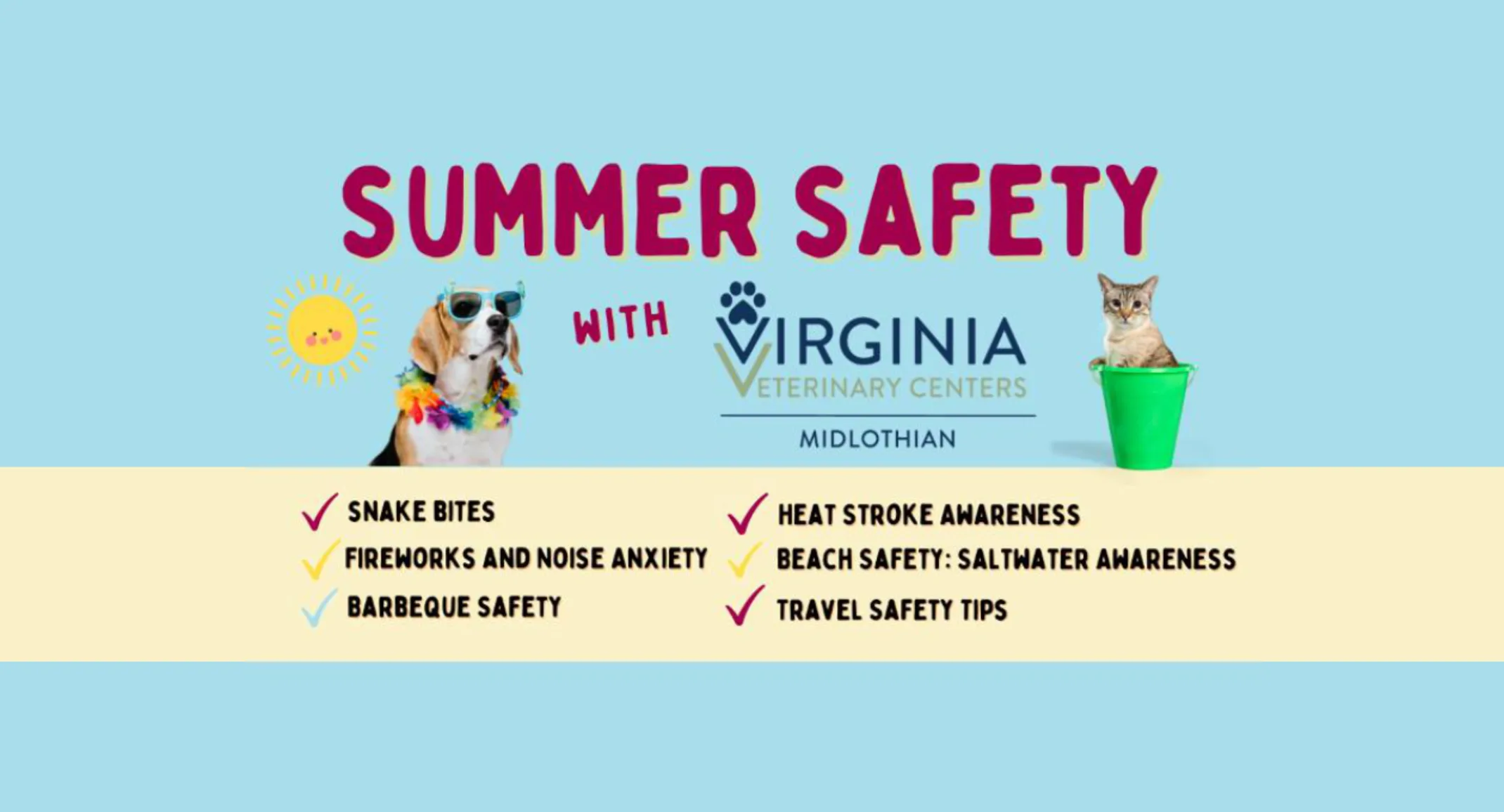Summer Safety Series with Virginia Veterinary Centers (VVC) Midlothian: Keeping Our Furry Friends Safe!
Pet Safety

As the sun beams down and summer adventures beckon, it's vital to ensure our pets remain safe and healthy throughout this exciting season. From beach trips to backyard barbecues, there are endless opportunities for fun. However, as pet owners, it’s our responsibility to safeguard our beloved furry companions during these joyful outings! In this Summer Safety Series, we’ll explore essential tips to help protect our pets and ensure they thrive in the sun-soaked days ahead.
1. Heat Stroke Awareness: Keeping Cool is a Must!
Did you know that the American Veterinary Medical Association (AVMA) estimates thousands of pets suffer from heat-related illnesses each year, with many unfortunately not surviving? Heat stroke can occur quickly in high temperatures, even if pets are outside for just a brief period. Brachycephalic breeds, such as English Bulldogs, are particularly vulnerable because they struggle to cool down effectively. The symptoms of heat stroke—including excessive panting, drooling, lethargy, and confusion—can escalate rapidly.
Effects of Heat Stroke: When a pet suffers from heat stroke, their body temperature can rise to critical levels, leading to cellular damage and organ failure. Treatment must be prompt; if left untreated, heat stroke can lead to severe neurological effects, shock, or even death.
Prevention Tips:
Hydration: Always provide fresh water for your pets and monitor their intake.
Shade: Ensure they have access to shady areas to escape the sun’s harsh rays.
Cool Down: Set up a kiddie pool or a shallow water source for them to submerge themselves on hot days. But remember, if you suspect heat stroke, get them to a cooler environment immediately and avoid cold water immersion, which can escalate their condition.
Emergency Contact: If you notice symptoms of heat stroke, contact us immediately at 804-744-9800.
Temperature ranges for safely walking dogs outdoors:
60°-64°F: Safe for all dogs
65°-69°F: Safe for small & medium dogs, potentially moderate risk for some large breeds
70°-75°F: Unlikely risk for small & medium dogs, moderate risk for large breeds or at-risk dogs
76°-80°F: Potentially unsafe heat for all dogs, moderate to high risk for larger dogs
81°-85°F: Dangerous heat for all dogs - use extreme caution or avoid walking outside
86°-100°F: Too hot to walk your dog
Asphalt, concrete and sand on a sunny day can sometimes be 40°-60° hotter than the air temperature. Hot pavement can damage your pup’s paws in as little as 60 seconds! Puppies are especially vulnerable to hot surfaces since their paws haven’t developed calluses yet. To check if the pavement is too hot, place your hand (or bare foot) on a sunny part of the pavement. If you can’t comfortably keep your hand there for 10 seconds, the pavement is too hot for your dog’s paws, which can burn and blister. Contact with hot pavement also raises your dog’s body temperature, which can lead to heat exhaustion or heat stroke.
2. Water Safety: Dive In with Caution!
From beach trips to lake days and home pool parties, swimming is a classic summer pastime. However, always keep your pet's safety in mind—after all, not all animals are natural swimmers!
Why Saltwater is Toxic:
When pets consume saltwater, it leads to a condition known as hypernatremia, where there is an abnormal increase of sodium in the blood. The high salt concentration can cause severe dehydration, vomiting, diarrhea, and neurological issues. Continued exposure to saltwater without fresh water can be life-threatening, so always encourage your pets to hydrate properly.
Safety First:
Supervision: Always watch your pets closely when they are near water.
Hydration: Bring fresh water along to keep your pet hydrated.
Life Jackets: Invest in a doggy life jacket for those pets who may need a little extra help in the water.
Watch for Distress: Keep an eye out for signs of distress, such as excessive panting or difficulty swimming. If your pet swallows saltwater, it can lead to dehydration and digestive distress, so be proactive. If any concerning symptoms arise, don’t hesitate to call us at 804-744-9800!
3. Travel Safety Tips: Adventure Awaits!
At VVC Midlothian, we believe that no summer is complete without a road trip. If you plan to bring your furry friends along for the journey, preparation is key! Some pets can experience motion sickness, which may put a damper on your travel plans. Consulting your veterinarian before you hit the road is wise to ensure everyone enjoys the adventure.
Risks of Improper Restraint:
Neglecting to secure your pet in a vehicle can lead to serious injuries. In the event of sudden stops or accidents, unrestrained pets can be thrown around the car, leading to trauma, fractures, and even death.
Safe Travel Tips:
Secure Space: Use a crate or a pet seatbelt to keep your pet safe and secure during travel.
Never Leave Unattended: Avoid leaving your pet in a parked car, even for a few minutes; temperatures can spike dangerously fast!
Frequent Breaks: Plan your route to include regular stops for bathroom breaks and hydration.
Remember, the journey can be just as enjoyable as the destination, especially with your furry companion by your side!
4. Fireworks and Noise Anxiety: Preparing for Loud Celebrations!
Summer celebrations are around the corner, especially with the Fourth of July approaching. Fireworks can evoke joy in humans but can be a source of stress for our pets. Many animals experience anxiety and fear during these loud celebrations, often leading to a frantic flight response.
Dangers of Running Away:
Pets spooked by fireworks may bolt in an attempt to escape the noise, leading to tragic outcomes such as getting lost or being hit by cars. The chaos can not only endanger their lives but also result in injuries and trauma.
Preparation is Key:
Safe Space: Create a comforting environment indoors where your pet can retreat with their favorite toys to feel secure.
Consult a Vet: If your pet struggles with anxiety, discuss calming medication options like trazodone with your veterinarian beforehand.
Stay Close: Being nearby can help provide reassurance during the scary noises of fireworks.
Let’s ensure our furry friends enjoy the holidays as much as we do by taking these precautions!
5. Barbecue Safety: Grill with Care!
Summer wouldn’t be complete without delicious barbecues with family and friends, but it’s crucial to be mindful of what our pets consume during these gatherings, as some foods can pose serious health risks.
The Dangers of Pancreatitis:
Rich, fatty foods, especially pork, can cause pancreatitis in dogs. This inflammatory condition can lead to severe abdominal pain, vomiting, diarrhea, and, in critical cases, it can be life-threatening. Animals suffering from pancreatitis often require extensive veterinary care and hospitalization.
Obstruction Risks from Corn Cobs:
Corn on the cob is a common barbecue treat, but it can pose significant risks for pets. If a dog ingests a corn cob, it can lead to intestinal obstructions. The shape of the corn cob makes it difficult for dogs to digest, and it can get stuck in the intestines, potentially leading to life-threatening perforations in the bowel that may require urgent surgical intervention.
Food Safety Tips:
Avoid Harmful Foods: Make sure to keep the "dangerous" foods away from your pets, including onions, grapes, and chocolate.
Safe Treats: Instead, offer pets small amounts of safe treats like bland turkey dogs or watermelon, keeping moderation in mind to avoid any digestive upsets.
6. Snake Bite Awareness: Adventure with Caution!
As we embark on summer hikes and outdoor excursions, the risk of snake bites can increase. With snakes more active in the warmer months, it’s essential to keep our pets close and vigilant while exploring nature.
Effects of Venomous Snake Bites:
If bitten by a venomous snake, pets can experience severe health effects, including swelling, pain at the bite site, difficulty breathing, and lethargy. In some cases, the venom can cause systemic issues leading to shock, organ failure, or even death if immediate medical treatment is not provided.
Recognizing Danger:
Signs of a Bite: Look for symptoms such as swelling, pain, or lethargy. Discharge at the site of the bite is also a concern.
Document the Encounter: If it’s safe to do so, try to photograph the snake to help our veterinary team identify the species and determine the appropriate treatment.
Immediate Action: If you suspect a bite from a snake, contact us right away at 804-744-9800 for guidance. Keep your pets leashed in wooded areas and stay alert to protect them from potentially dangerous encounters.
Summer Safety with Virginia Veterinary Centers (VVC) Midlothian
At VVC Midlothian, we are genuinely excited for the summer season! While it offers abundant outdoor fun, it’s crucial to recognize and prepare for the various dangers our furry friends may face. From heat stroke and water safety to travel tips, noise anxiety, barbecue precautions, and snake bite awareness—being informed is the first step toward keeping our pets safe. If you believe your pet may be having an emergency this summer, our emergency services & urgent care services are available to help. Contact us right away:
Let’s relish these beautiful summer months while providing the best care possible for our four-legged family members. If you have further questions or need assistance, don’t hesitate to reach out to our team at VVC Midlothian. Here’s to a safe, sunny, and enjoyable summer filled with unforgettable adventures and happy moments with our pets!
Don’t forget to share your summer experiences and any insights you’ve gained along the way with us on our Facebook and Instagram! Together, we can ensure that our pets remain safe and healthy all summer long!
